 Petzlover
Petzlover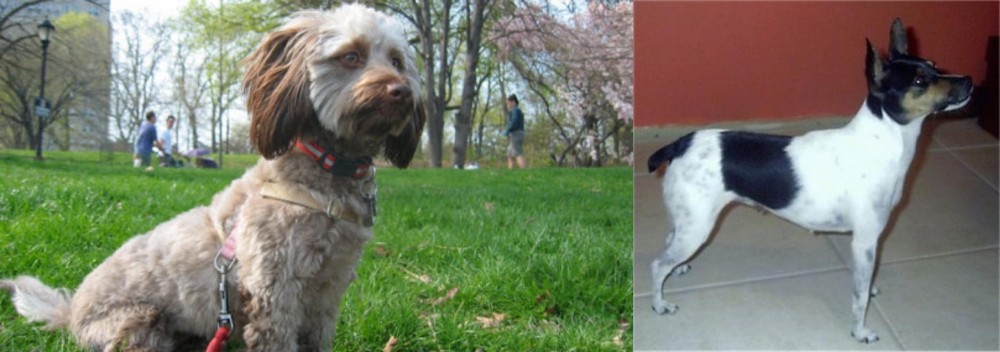 Doxiepoo is originated from United States but Miniature Fox Terrier is originated from Australia. Both Doxiepoo and Miniature Fox Terrier are having almost same height. Both Doxiepoo and Miniature Fox Terrier are having almost same weight. Both Doxiepoo and Miniature Fox Terrier has almost same life span. Both Doxiepoo and Miniature Fox Terrier has almost same litter size. Doxiepoo requires Moderate Maintenance. But Miniature Fox Terrier requires Low Maintenance
Doxiepoo is originated from United States but Miniature Fox Terrier is originated from Australia. Both Doxiepoo and Miniature Fox Terrier are having almost same height. Both Doxiepoo and Miniature Fox Terrier are having almost same weight. Both Doxiepoo and Miniature Fox Terrier has almost same life span. Both Doxiepoo and Miniature Fox Terrier has almost same litter size. Doxiepoo requires Moderate Maintenance. But Miniature Fox Terrier requires Low Maintenance
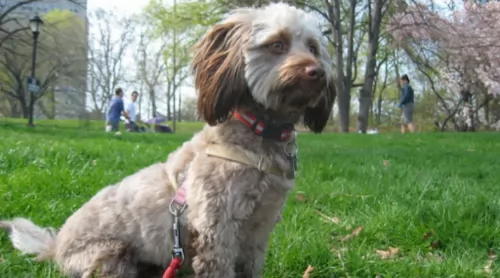 The Doxiepoo is a designer dog breed - a combination of the Dachshund who was used to hunt for Badgers and the Poodle, a dog bred in France to essentially be a lap dog. There is however some dispute as to whether the Poodle descends from Germany or from the French Barbet.
The Doxiepoo is a designer dog breed - a combination of the Dachshund who was used to hunt for Badgers and the Poodle, a dog bred in France to essentially be a lap dog. There is however some dispute as to whether the Poodle descends from Germany or from the French Barbet.
Wherever the parents hail from, the Doxiepoo hails from the United States of America.
With both the Poodle and the Dachshund being intelligent, fun and loving type of canines, the two of them together have brought out a wonderful hybrid pet in the Doxiepoo. Today, the Doxiepoo is bred with other Doxiepoos.
 Known as Mini Foxies or Toy Fox Terriers, these dogs hail from Australia, having been bred there since the 1800s already.
Known as Mini Foxies or Toy Fox Terriers, these dogs hail from Australia, having been bred there since the 1800s already.
They are descendants of fox terrier types which were bred in England and then brought to Australia by early settlers.
It is believed the small Smooth Fox Terriers were crossed with Manchester Terriers and then the puppies further bred and crossed with other small breeds. The idea was to have a small, light, quick dog. The Miniature Fox Terrier is exactly like this, developed as a hunting dog.
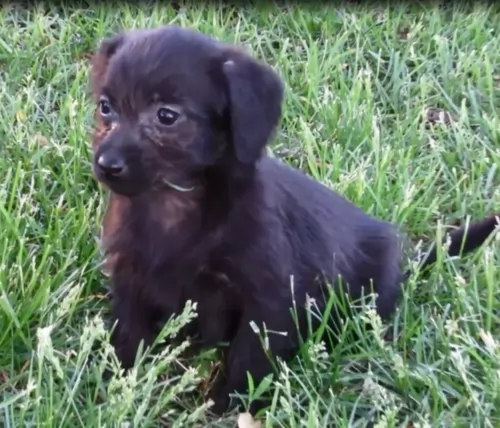 The Doxiepoo can range from being a small to medium sized dog, standing at anything between 20cm to 25cm in size and weighing between 3kg and 7kg, depending much on whether a standard, miniature or toy sized poodle was used in the breeding.
The Doxiepoo can range from being a small to medium sized dog, standing at anything between 20cm to 25cm in size and weighing between 3kg and 7kg, depending much on whether a standard, miniature or toy sized poodle was used in the breeding.
The Doxiepoo could look like either one of the two breeds, but he will have a strong, sturdy body with a curly or wavy coat of varying lengths and various colors - cream, black, tan, apricot, grey or white. The poodle side of him ensures he is a hypoallergenic dog.
Between the Dachshund and the Poodle, you’re going to get a wonderful array of characteristics as they both come with their strong points. Certainly you will be well entertained and amused by your pet, while he can also be useful as a watchdog.
Being a small dog, he will fit well into life in the city or in the countryside. He is as bright as a button and learns tricks and new skills quickly. With training and socialization he becomes obedient and well behaved wherever he is, getting on well with other pets in the home as well as with all children and adults.
The Doxiepoo is a lively, alert, energetic dog and will require being exercised – lots of ball games and a walk will keep him lean, muscular and content.
 With longevity on his side, the Miniature Fox Terrier can live to be between 10 and 14 years of age or live to be even older - up to 18 years of age.
With longevity on his side, the Miniature Fox Terrier can live to be between 10 and 14 years of age or live to be even older - up to 18 years of age.
He stands at between 24 – 30cm and weighs anything between 3 and 6kg. His coat is short but he sheds quite a bit so regular brushing will become necessary.
The coat is smooth and is mostly white and tan or white and black but it can be tri-colored too – white, black and tan.
The ears are semi-erect, semi floppy and he has a bright, expectant look about him. The tail has always been traditionally docked, giving him a distinctive look, but now it tends to be undocked.
Your Miniature Fox Terrier is a bold little dog, and is protective and loyal towards his human family. He is lively and courageous and has lots of energy so he will be wanting lots of games indoors and out. He will love to go on a walk every day.
They make great family pets, getting on well with children and other pets in the home. They’re adaptable and can do well in the city or the countryside.
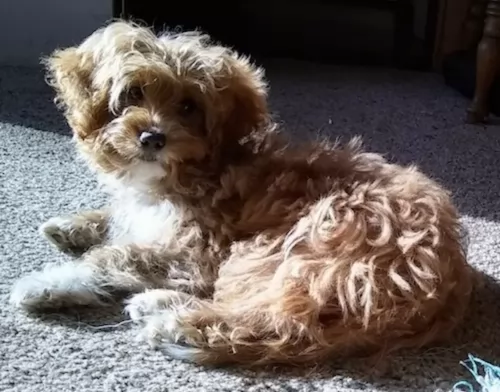 Every dog, even the little ones like this, will require some kind of input from you if you want to get the best from him. Every puppy bought as a gift when they’re cute and cuddly turns into an adult, and often the very person who received him as a gift, loses interest and neglects him. Then they wonder why the dog becomes irritating and destructive.
Every dog, even the little ones like this, will require some kind of input from you if you want to get the best from him. Every puppy bought as a gift when they’re cute and cuddly turns into an adult, and often the very person who received him as a gift, loses interest and neglects him. Then they wonder why the dog becomes irritating and destructive.
A dog is a long term investment and if you commit to your sweet Doxiepoo, you’ll get years and years of devoted friendship.
 Miniature Fox Terriers aren’t going to disappoint you one bit in terms of making an excellent pet.They make great family pets. They are loyal companions and they also make great watchdogs, being able to adapt to life in the city as well as the countryside.
Miniature Fox Terriers aren’t going to disappoint you one bit in terms of making an excellent pet.They make great family pets. They are loyal companions and they also make great watchdogs, being able to adapt to life in the city as well as the countryside.
They can yap quite loudly so you need to be careful of this if you live in a small property in the city.
This is such a jaunty little dog, full of fun and high spirits. You won’t know a dull moment with such a friendly, entertaining little pet. In exchange for all he offers you in terms of friendship, he also wants your love and attention.
Provide him with good food, a good deal of exercise, a dry, warm place to sleep and your ongoing attention and he is going to shower you with his love and loyalty.
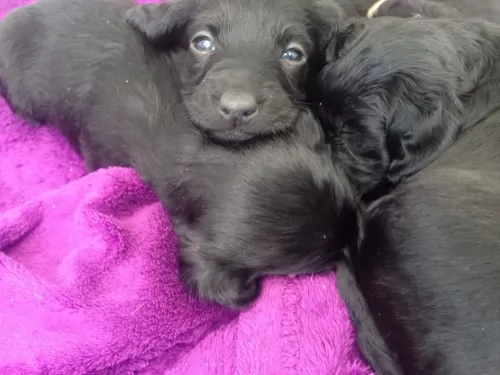 The life expectancy of the Doxiepoo is around 12-15 years of age if he is well looked after. He is a robust dog, but he can still face some health issues that both his parents contend with.
The life expectancy of the Doxiepoo is around 12-15 years of age if he is well looked after. He is a robust dog, but he can still face some health issues that both his parents contend with.
Just some of the diseases that the Doxiepoo might face while in your care are ear- and skin infections, dental disease, digestive tract problems, heart conditions and epilepsy. If you think your pet has any kind of illness, it is imperative to get him to the vet for a checkup.
Poodles, particularly are prone to skin disorders. They can be allergic to grass, parasites and food. If your Doxiepoo chews or licks his paws or some other area a lot, and the skin is red, he could have a skin allergy.
The vet will be able to diagnose your dog’s allergies with some skin- or blood testing. For instance, sebaceous adenitis is an inherited allergy that affects the lubrication of the skin and hair follicles. Symptoms of the disease include scaly skin, sore and even hair loss.
 Your Miniature Fox Terrier can live to be between 10 and 14 years of age when looked after well, but there are one or two common dog illness that can plague any dog, and Paella Luxation is one.
Your Miniature Fox Terrier can live to be between 10 and 14 years of age when looked after well, but there are one or two common dog illness that can plague any dog, and Paella Luxation is one.
Patella luxation is fairly common with small dogs, occuring when the dog’s kneecap becomes dislocated from its thigh bone.Your dog will skip and hop along. Treatment for patella luxation can range from non-invasive treatments such as massage to surgery.
Dental health is important too, and seriously bad breath can be indicative of dental decay. Dental plaque can cause bad breath and lead to other health problems that aren’t directly related to teeth. The heart and kidneys can be put at risk. There are dental products such as canine toothbrush and toothpaste which can be used to clean your dog’s teeth. Don’t ever use human toothpaste as this can be toxic for your pet.
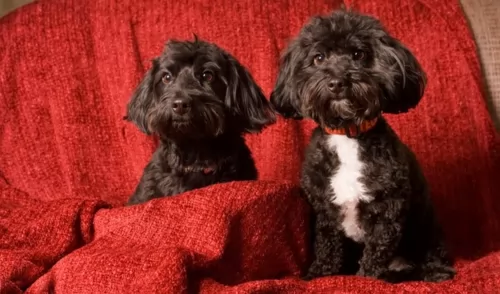 You can’t be sure what kind of coat your Doxiepoo will have but he will certainly require brushing at least twice a week. In some instances it may be wise to seek out the services of a professional groomer who does an excellent job of trimming the hair, cleaning the teeth, checking the ears and clipping the nails.
You can’t be sure what kind of coat your Doxiepoo will have but he will certainly require brushing at least twice a week. In some instances it may be wise to seek out the services of a professional groomer who does an excellent job of trimming the hair, cleaning the teeth, checking the ears and clipping the nails.
The Doxiepoo, just like any other dog, will need to be trained and socialized early as he is a stubborn dog and will need to be trained to be obedient. With this training and socialization, he becomes amicable around children and pets in the home. He learns easily too and this is what makes him a great pet for first time dog owners.
The Doxiepoo is a moderate energy dog, so he will do well on a walk every day. You can also make use of ropes, balls and frisbees to give him a bit of a workout in the garden.
He loves water too and will enjoy a run on the beach and cooling off in the ocean. He adapts easily to life in the city or in the country, so long as he is with his human companions.
The Doxiepoo will eat dry kibble, particularly if it is from the highest quality brands and chosen according to the dog’s size, age and activity levels.
Now and then you can add in a little bit of cooked rice, vegetables and chicken for variety. Some raw meat can play an important role in keeping the skin healthy and free from dryness and itchiness. Make sure that he always has fresh, cool water available to him.
 Feed your terrier a quality commercially manufactured dog food twice a day. They are small dogs, but highly energetic so choose dog foods which are geared towards small, energetic dogs.
Feed your terrier a quality commercially manufactured dog food twice a day. They are small dogs, but highly energetic so choose dog foods which are geared towards small, energetic dogs.
His age and his activity levels will also give you an idea as to what to feed him. Apart from dry kibble, give him simple, tasty, nutritious home-made food too.Every now and again, add in boiled chicken, brown rice or pasta and some cooked vegetables such as potato, carrots and spinach. A little bit of raw meat occasionally can also do wonders.
Keep meals plain and simple like this to avoid stomach upsets.
Ensure your pet has constant access to fresh, cool water.
Brush him twice a week to keep the coat free of loose hair. Try and avoid bathing your pet as it causes dry skin and itchiness. Rather wipe him down with a rubber grooming mitt to keep him groomed.
Check his eyes and ears for infection. Check for fleas and ticks and any unusual lumps. Trim his nails too.
Take him to the vet when he appears to be ill and keep his vaccines up to date.